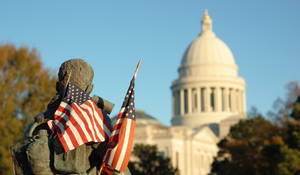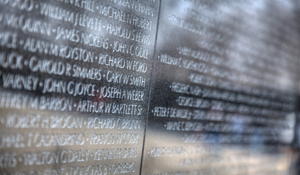 The week before Memorial Day I traveled to Washington D.C. to visit the monuments to our nation's military veterans. The vast Arlington National Cemetery, the profound Lincoln memorial inscribed with his immortal reflections on war and nation, the noble World War II memorial, the Freedom is Not Free advisory on the Korean War Memorial and, finally, the touching and humble Vietnam Veterans Memorial Wall.
The week before Memorial Day I traveled to Washington D.C. to visit the monuments to our nation's military veterans. The vast Arlington National Cemetery, the profound Lincoln memorial inscribed with his immortal reflections on war and nation, the noble World War II memorial, the Freedom is Not Free advisory on the Korean War Memorial and, finally, the touching and humble Vietnam Veterans Memorial Wall.
I was visiting the monuments hoping to rekindle the feelings of patriotism, sacrifice, and national unity that had inspired me my entire life but, sadly, I could feel slipping away amid the constant political controversy and bitter partisan divide that characterizes our present-day national discourse.
As I walked slowly along the Vietnam Veteran’s memorial wall reading names at random and looking for friends and relatives who had served and died in Vietnam, I found myself surrounded by a large group of veterans paying their respects to their fallen comrades. These veterans were old men, now, (most being slowly pushed along in wheelchairs), silently recalling the horrors of their Vietnam experience, and remembering the buddies who never came home. You could see it in their eyes. Some were quietly weeping.
Standing Behind the Wheelchair
As I lingered among them hoping to share the feelings they so proudly possessed, I noticed the men and women who were pushing the wheelchairs. Most wore caps and insignias that marked them as veterans. They were one or two generations younger than the Vietnam Vets they escorted. They had served in Desert Storm, Iraq, Afghanistan, and the global war on terror. Some bore the wounds of war, artificial limbs, awkward gaits, canes, and service dogs. Still, they pushed the old vets along the wall with a respect and tenderness that only those who shared the sacrifice of war could conjure or display. That tableaux of comrades in arms rocked me, and I had to find a bench to sit and gather myself.
Never The Same
"When you go off to war, you never really return. You end up a stranger among your own people. That's why veterans gather here at the wall. We're not strangers here," said a burly vet with a full beard dressed in combat fatigues and a regimental beret. “As long as I can walk," he said he would help his brothers who no longer could. "The most dangerous thing a vet can do is come home to heal alone. You know you did your best but so many of your buddies didn't make it back. Somehow that makes you feel bad about yourself, and you're not sure how their loved ones feel about you. You begin to isolate and go downhill fast. I came to the wall for the first time ten years ago and have returned to the wall every day since. I was never a stranger here. I get these guys, and they get me. That feeling has kept me alive. I come and help the visiting vets to experience that feeling any way that I can. It looks like I'm just propping up their broken bodies, but really, I'm trying to help them repair their soul; to get that feeling that they are not alone.
The other vets who come and the thousands of grateful and respectful Americans who visit every day embrace and admire these visiting veterans healing them on the spot. I just don't know how long it lasts after the vets leave Washington. The healing often starts here at the wall, but it can only be a cure if it continues across the country. What these vets need to feel is that we are all in these wars with them. We’re united in our love for this great experiment in human freedom we call the United States of America. I guess that’s what we all need to feel.”
We hope you enjoyed reading this blog selection. You can read more about issues/solutions for mental health/veterans by clicking the provided link. Enjoy our content? Then please subscribe for instant, weekly or monthly updates!

